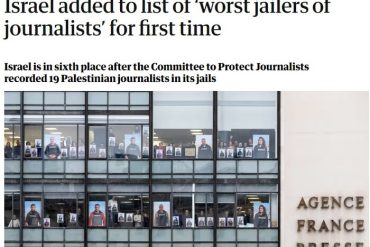Written by David Collier
This week the Guardian published a letter that was co-produced by Elleanne Green, founder of Palestine Live. The letter was a defence of Chris Williamson and a denial of the antisemitism in the Labour Party. That in itself is a disgrace. But the Guardian’s issue with Jewish people and Israel extends back much further than Corbyn. Anyone researching antisemitism today knows that Corbyn is a symptom of the problem, not the cause of it.
Better days at the Guardian
From the Guardian Newspaper, April 11 1950. ‘The Arab League is still in the wilderness. It made little headway at its recent meeting in Cairo. In its attitude towards Israel it has not yet advance beyond a sullen resentment at having been beaten‘.
That was the Guardian seeing and telling the truth. Some of the Arab players never changed their stance. Never moved beyond the resentment of having been beaten. But somewhere along the line, the Guardian (along with many media outlets) either forgot or developed a serious case of blindness to the underlying truth of the conflict.
Antisemitism and anti-Zionism
The conspiracists will tell you that Jews started attacking the Labour Party only when Jeremy Corbyn took control, because of Corbyn’s sympathy for the Palestinians. Yet most Zionists have sympathy for the Palestinians, which makes the conspiracy a rather demonising straw man. If we step back again, this time to 1953, things become much clearer. It was the end of the Slanksy trial. Fourteen leading Communist party members had been accused of a Zionist conspiracy and convicted. Eleven were hanged in Prague on December 3 1952. Most of the accused were Jewish. It was an antisemitic show-trial.
The Guardian never shirked from criticising this demonisation of Zionism. It recognised the anti-Jewish nature of the anti-Zionist accusations without reservation, and although the trials referenced ‘anti-Zionism’, the Guardian continually described the actions as ‘anti-Jewish’. This from a letter to the editor on January 19th 1953:
“If we allow ourselves to be persuaded that the Soviet accusation is not antisemitism, but just anti-Zionist or anti-Israel, then we are helping to endanger two-and-a-half million Jews.”
Page two of that paper carried a major article describing the outrage of the Board of Deputies. The paper would talk about anti-Zionist policy as if it were antisemitism – without question. Representatives from the Board then made two interesting quotes. Firstly, the indivisibility of Jewish people and Zionism:
“Zionism is essentially a Jewish movement which worked for the creation of a Jewish state in the ancient homeland of the Jewish people. Consequently, Zionism cannot be divorced from Jewry and in the public mind the two are identified”
But then, they referenced a small group of Jewish people, who disagreed.
Jewish defenders
The whole world knows today, that those events were antisemitism trying to disguise itself as anti-Zionism. And yet a handful of Jewish people still defended the slaughter following this show-trial. How did they do it? By trying to legitimise the Soviet argument that it was anti-Zionism and not antisemitism. But consider this difference. The Guardian in 1953 gave oxygen only to the mainstream Jewish voice, and the dissenting minority were seen as little but apologists for murder, worthy only of disdain.
Today we can see all the old ‘anti-Zionist’ arguments of Soviet Communism being used again by the antisemites, as a means of disguising their dislike of Jews. Can you imagine in 1953 the Guardian ignoring the Board of Deputies and running apologist letters from a handful of dissenting communist Jews legitimising the antisemitic murders in Prague? Yet this is the type of action they take today. Thus we can see that the Guardian has changed. It now gives a voice to the extremists as a means of legitimising the things it once clearly saw as antisemitic. The Guardian has blatantly turned its back on the Jews.
The Guardian and the boycott
The Arabs have been boycotting the Jews for a hundred years. In the 1960s, some British firms readily cowed to Arab pressure. In 1963 Norwich Union forced the resignation of Lord Mancroft, because the Arabs had asked them to be rid of the Jewish Peer. The Guardian editorial on 4 Dec 1963 on the matter of the boycott was clear. It was bullying, no good for anyone and needed to be ignored:
Here is a simple Guardian editorial headline; ‘How to beat the Arab boycott‘:
Zionism as racism
History shows us that since the defeat of Nazi Germany, the two most violent strains of antisemitism have been within the Islamic world and the Communist world. Both, often dressed up as anti-Zionism. During the cold war they formed an alliance, which often reared its head in international bodies such as the United Nations. Just look at this piece from the Guardian following the UN vote “Zionism is racism”:
There were numerous Guardian articles that referenced the vote throughout November and December 1975. All of them highly critical. An editorial titled ‘a wild swipe at Israel’ pointed out the racist, undemocratic nature and hypocrisy of the blocs voting in favour at the UN. And during this time they only carried one of the Guardian style letters they would later become so infamous for – a letter from around 150 British MPs clearly calling the anti-Zionist vote a form of antisemitism:
It is difficult to believe this is the same newspaper. The Guardian never had a problem identifying anti-Zionism for what it was. It recognised the Arab refusal to accept defeat as the underlying cause of the conflict, saw antisemitism in the anti-Zionist rhetoric of the Soviet Union and had no problem swiftly identifying the Arab boycott for what it was. The Guardian was often critical of Israeli government policy but easily saw through anti-Zionism as the antisemitic cause it so clearly is.
What changed at the Guardian?
This isn’t difficult. The ‘rational left’ lost its soul when it became infected by the very viruses it used to be able to identify. It saw Islamic antisemitism until it became infected with it. So too Soviet antisemitism. Today those people writing these letters to the Guardian support the same ideology as those the Guardian quickly dismissed back in 1953. They started to use these media outlets to push their obsession. This is a map of the increase in Guardian mentions of the word ‘Israel’ from 1947-2003:
1966-1967, which includes the six-day war and its aftermath, saw 960 articles. 2002-2003 was to reach 3,402. I can only imagine how bad things are today. To put this in perspective. Israel’s 3,402 came over 24 months. ‘Congo’ did not even make 1,500 articles over the whole five years of the Second Congo War that cost millions of lives. Adding Rwanda to the search terms didn’t make much difference. Israel has become a Guardian obsession.
It becomes even more interesting when we search for ‘anti-Zionism’. Beyond criticism, until the 1990s there were no references to the words in the Guardian archives and a whole year could pass without a single article using it. In 1998 there was one article. Another two in 1999 and 2000. In 2001 that double to four and in 2003 it tripled to thirteen. Since then it has risen to a tsunami.
The only reference in 1998 was to a book from the 1930s. In 1999 the play ‘Perdition‘ was on the theatre pages as it enjoyed a short run at the Gate Theatre. January of 2000 saw David Ceserani used the term when he was critical of Norman Finkelstein. In June, John Fordham wrote a Jazz column about Gilad Atzmon. Then in August 2001, there was a mention in article about the Woodcraft folk, and the complexities of global politics. In September it was another Jazz advert for Gilad Atzmon.
Guardian and the new millennium
In 2001, the UN conference on Durban took place. Similar in tone to the ‘Zionism is Racism’ arguments from the 1970s, this was the UN at its very worst. And it is in 2001 we can draw comparisons. Where the Guardian had seen the hypocrisy of the UN in the 1970s, the Guardian of 2001 was now partially embedded into the same mindset. It ran several articles with some criticising the conference, but suggested in many, that Israel only had itself to blame. At the end of the year it allowed the UN’s Mary Robinson to write about the disgraceful event as a ‘remarkable coming together’.
Almost simultaneously things got worse. The first proper article in the Guardian on anti-Zionism that would be recognisable today was published on 22 Dec 2001. It was an article by Faisal Bodi. According to Mike Gapes, Faisal Bodi was a ‘polemicist for extreme Islamic causes‘. He blogs for the pro-Hezbollah IHRC and has been referenced in a CST report on antisemitism. After a few years he was removed from the Guardian pages but not before he had pushed dozens of articles on their pages. Islamist antisemitism, which sees Zionism as some type of global plot, had infected the Guardians editorial vision.
The movement down the dark path was swift. By January 4 2002, the Neturei Karta had their first letter printed in the paper. Anti-Zionism was a new hot topic. Liberal Jews were sought who would downplay the issue and articles such as one written by Rabbi David Goldberg telling Jews not to overstate antisemitism were published. Michael Rosen appeared on the Guardian pages in January 2002 as well.
On Feb 25 2002, the Guardian ran an article about leftist antisemitism. The author makes some serious statistical mistakes when talking about Zionism within British Jewry. He does try to maintain a balance, but only between the Jews and those that would destroy them. At one point he suggests opposition to Israel, including opposition to its existence is a legitimate position. This is important because the author was Gary Younge, the current Editor-at-large for the Guardian.
We can end this section on 9th May 2002. An article slamming the accusation of antisemitism. All of the current arguments are inside. Antisemitism is mainly a right-wing problem – Anti-Arab racism is a bigger problem – Accusations of antisemitism are bogus and it is really all about Israel – and of course – If there is antisemitism, it is all Israel’s fault. The author? Seamus Milne, mastermind of the Jeremy Corbyn project.
By this time the Guardian had switched sides. All the pieces were in place. The Guardian was lost.
Boycott, boycott, boycott
The Arab league had tried and failed to reinstate the famous Arab boycott in the late 1990s. All references in the Guardian to boycotts of Israel, prior to 2002 were in reference to that. Until in February 2002, when the Guardian reported on a proposed student vote taking place at Manchester University to support the Boycott of Israeli goods. Then on Saturday April 6 2002, the Guardian changed the game completely. Where it had previously seen the boycott of Israel as something to oppose, it now ran a letter, signed by 125 academics calling for an academic and cultural boycott of Israel:
It didn’t know it yet but BDS had just been born and the Guardian had placed itself as the UK’s central BDS publishing outlet. There was clearly an editorial decision and since then, every major BDS push has been given space on the Guardian’s page. On 7 May 2002 there was a report on a conference of the Association of University Teachers. It was all about the gender pay gap. Suddenly towards the end of the article, the writer squeezed in a reference to the Israeli boycott. The AUT were not even considering a vote on it, nor did it fit the context of the article – but for some reason, it got a mention. Journalists at the Guardian were actively trying to normalise the anti-Israel boycott.
The hard-left had spoken, but what about the Islamists? On the same day as the AUT article, 7th May, the Guardian ran an advert calling for a boycott of Israel. The signatories? The Muslim Council of Britain, the Friends of Al Aqsa, the Palestine Return Centre, The Palestine Solidarity Campaign, the IHRA and all the other organisations that have spent the last two decades demonising Israel and spreading antisemitism:
The letters never stopped
With the seeds planted, BDS launched in late 2004, evolving into the movement we know today in 2005. Over the last two decades, the Guardian have slipped further and further into the abyss. Pushing an endless stream of letters calling for a boycott of Israel. Always the same names, over and over again. Whenever Israel could be criticised or antisemitism needed to be downplayed, the Guardian would publish a letter with multiple signatures. Gaza, settlements, antisemitism. The same letter, written and signed by the same people. On Israel the Guardian promote a pro-Islamist, pro-Marxist world vision, and have relegated the Jewish mainstream to an annoying afterthought. Anti-Zionists like Jonathan Rosenhead return dozens of results on the Guardian search engine. Why? Who on earth is he?
We know these names off by heart. We see them time and time again. People like Tony Greenstein, Haim Bresheeth, Steven Rose, Miriam Margolyes, Deborah Fink, Leah Levane, Richard Kuper, Graham Bash, Naomi Wimborne-Idrissi and Mike Cushman. All those that have seen their name in print dozens, if not hundreds of times. And why? Just because they are Jewish opponents to Israel.
The Guardian had found the anti-Zionist Jewish fringe to use as cover, just as Jeremy Corbyn would do when he took power in 2015. Seamus Milne even left the Guardian to protect him, bringing with him no doubt the lessons that he had learned.
And today
The Guardian has been happily baiting British Jews for years. This week it ran yet another letter. This one co-organised from within the Palestine Live group by the Founder Elleanne Green.
At what point did the Guardian sell out the British Jewish community to the whims of the antisemitic haters of Palestine Live?
Over the past four years, I have been contacted by every single major newspaper in the UK, except one. This blog has been at the forefront of research of the slide of the Labour Party towards institutional antisemitism. I have lost count of the number of political figures I have helped to expose. Yet I have no recollection of any journalist from the Guardian ever contacting me.
In fact, those who write for the Guardian are actively telling people to block those like me and other anti-racist campaigners on Twitter
David Hirsh wrote that ‘Antisemitic ways of thinking have seeped’ into what he called ‘the community of the good’ and says ‘most people in that community are not aware of them and don’t know how to defend against them‘. The Guardian is now indistinguishable from the very antisemitic organs that the newspaper itself used to hate. Unfortunately, like most of the ‘lost left’ if it had to undo the damage, it wouldn’t know where to start. It has swallowed far too much of the Islamist/Marxist ideological vision, to be able to distinguish the good from the bad. Baiting British Jews may as well be on the sports pages. The readers are left with nothing but a poisonous shadow of something that used to resemble a newspaper.
Related Articles
- Guardian publishes pro-Corbyn letter signed by anti-Semites (UK Media Watch)
- Gilead Atzmon, his defenders and their enablers (CAMERA)
- BBC ignores another cross-border terror tunnel (BBC Watch)

















